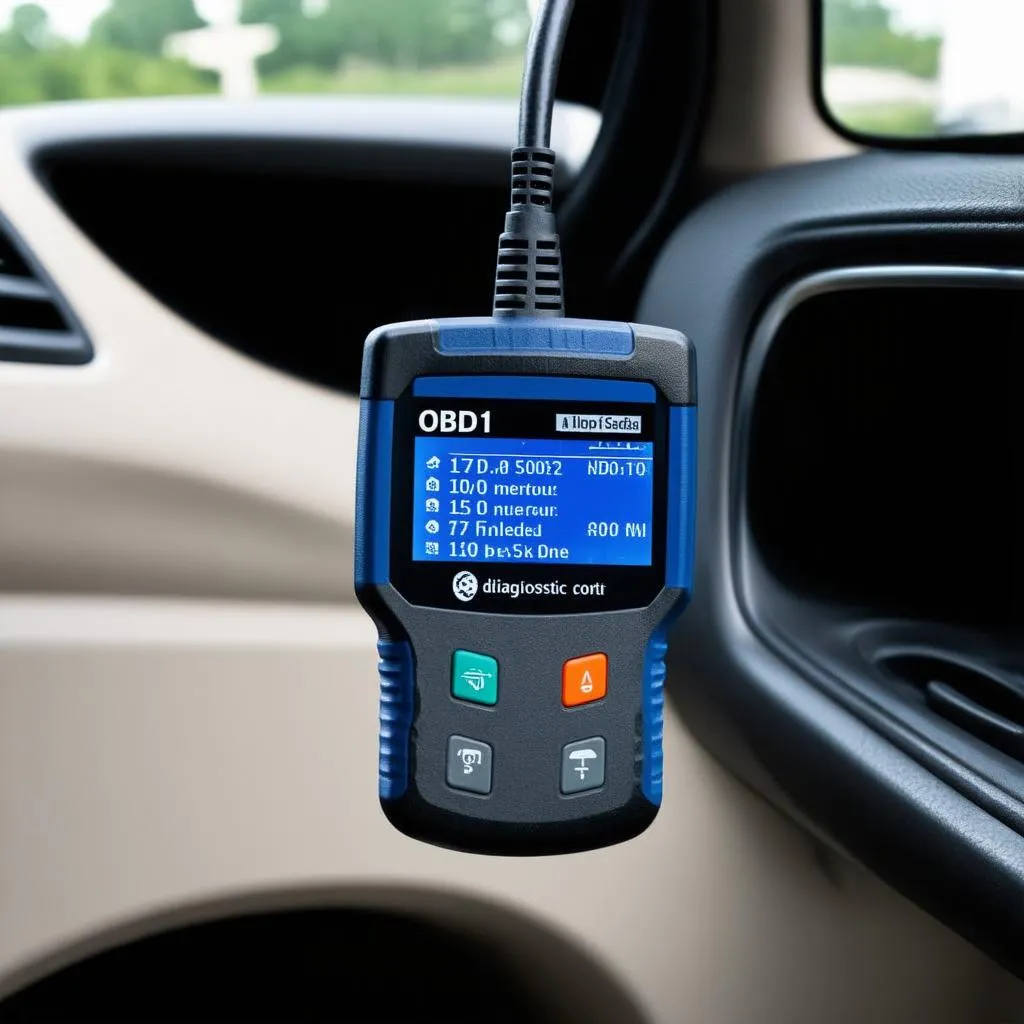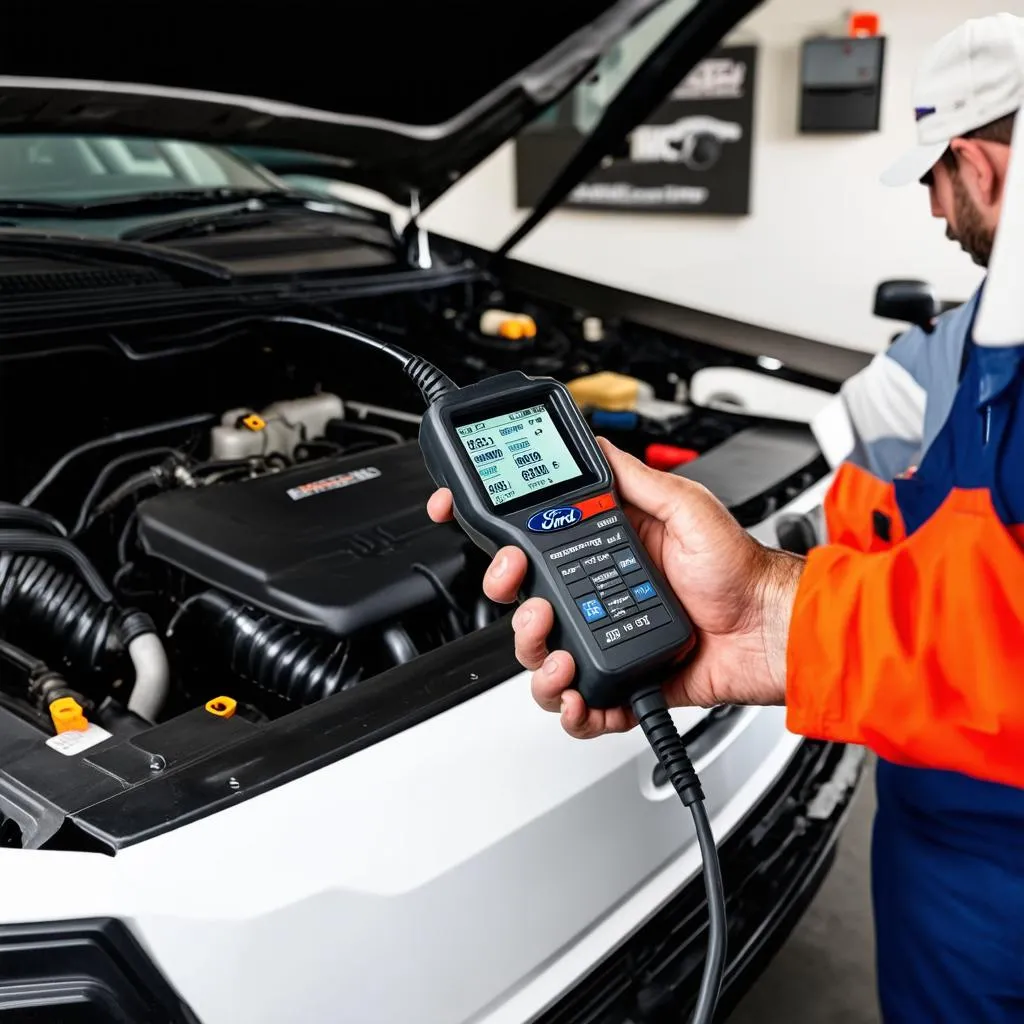Imagine this: you’re cruising down Route 66 in your classic 1995 Ford Mustang, the wind in your hair, when suddenly, the check engine light pops up. Your heart sinks. What’s wrong? How do you even begin to diagnose the problem? Enter the world of OBD scanners, your key to understanding your Ford’s internal dialogue. But hold on, is your Mustang speaking OBD1 or OBD2? Let’s unravel this mystery.
Understanding the Question: What’s the Big Deal with OBD1 vs. OBD2 Scanners for Ford Vehicles?
For the everyday Ford owner, this question translates to: “Which scanner do I need to figure out what’s wrong with my car?” From a mechanic’s perspective, it’s about choosing the right tool for the job, ensuring they can effectively communicate with your Ford’s computer system. On a technical level, we’re talking about two different generations of onboard diagnostics, each with its own communication protocols and capabilities.
OBD1 vs OBD2: Two Eras of Ford Diagnostics
Before we dive into the scanners, let’s clarify the difference between OBD1 and OBD2 in your Ford.
OBD1 (Pre-1996): Think of this as the early dialect of car diagnostics. Ford vehicles manufactured before 1996 typically used OBD1 systems. These varied significantly between models and even within model years. Diagnosing issues often involved deciphering blinking engine lights or using manufacturer-specific tools.
OBD2 (1996-Present): This is the standardized language most cars speak today. Starting in 1996, all Ford vehicles in the US adopted the OBD2 standard. This universal system made diagnostics more accessible with a standardized connector and communication protocol.
So, which scanner do you need?
The answer depends on your Ford’s model year:
- Pre-1996 Ford Models: You’ll likely need an OBD1 scanner, and it might have to be specific to your Ford’s make and model.
- 1996 and Newer Ford Models: An OBD2 scanner will be your go-to tool.
 OBD1 Scanner
OBD1 Scanner
Navigating the World of Ford OBD Scanners
Choosing the right scanner can seem daunting, but here’s a breakdown:
Ford OBD1 Scanners:
- Manufacturer Specific: Often, you’ll need a scanner specifically designed for Ford vehicles.
- Model-Specific Adapters: Due to variations in OBD1 systems, you might need an adapter to connect your scanner to your Ford’s diagnostic port.
Ford OBD2 Scanners:
- Universal Compatibility: Most OBD2 scanners work with all 1996 and newer Ford vehicles.
- Variety of Features: From basic code readers to advanced scan tools with live data streaming, there’s an OBD2 scanner for every need and budget.
Common Questions about Ford OBD1 vs OBD2 Scanners:
- Can I use an OBD2 scanner on my 1994 Ford F-150?
- Unfortunately, no. Your 1994 F-150 likely uses an OBD1 system. You’ll need an OBD1 scanner compatible with Ford trucks of that year.
- My 2000 Ford Focus has an OBD2 port, but the scanner isn’t reading anything. What’s wrong?
- Double-check that the scanner is powered on and properly connected to your vehicle’s diagnostic port, which is usually located under the dashboard on the driver’s side. If it’s still not working, there might be a problem with the scanner itself or a communication issue with the car’s computer.
- I have a classic 1965 Ford Mustang. Do I need a scanner?
- Your 1965 Mustang predates onboard diagnostics. You’ll need to rely on traditional troubleshooting methods.
 OBD2 Scanner Connected
OBD2 Scanner Connected
Need Help with Your Ford Diagnostics?
Choosing the right scanner and interpreting those cryptic codes can be confusing. Remember that article on converting a 1996 Ford Explorer to OBD1? That’s the kind of specialized knowledge we offer! We also have guides on the OBD ports in specific models, like the C4 Corvette, and reviews of popular scanners, such as the Bosch OBD 1100.
If you need expert advice on Ford diagnostics, don’t hesitate to contact us via WhatsApp at +84767531508. Our team of automotive specialists is available 24/7 to help you get back on the road with confidence.
Keep Your Ford Running Smoothly
Whether you’re tackling repairs yourself or seeking professional help, understanding your Ford’s diagnostic system is crucial. We encourage you to explore our website for more articles on Ford diagnostics, repair tips, and insightful automotive content. And remember, when it comes to your Ford, knowledge is power!